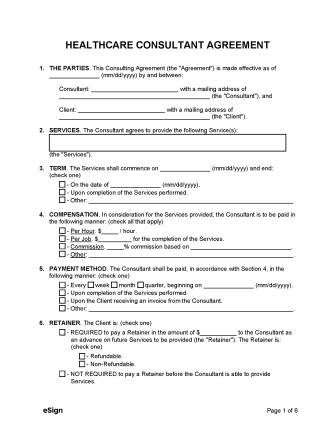

A healthcare consultant agreement sets the terms and conditions of a working relationship between a healthcare consultant and their client. By executing the document, the parties are afforded written, legally enforceable evidence of their rights and commitments. The form details the scope of work, financial obligations, start/end dates, and procedures for modifying the contract’s original provisions. Additionally, the agreement contains a confidentiality clause that protects the business information shared between the consultant and the client.
Healthcare consultant agreements should contain the following terms and conditions:
A healthcare consultant is an independent contractor hired by healthcare facilities, pharmaceutical companies, and related organizations to provide guidance on the most practical and effective means of running their business. The following are some notes concerning the profession:
Healthcare consultants pinpoint deficiencies in a healthcare organization’s operating procedures and performance and then recommend solutions to resolve those issues effectively. They can take on various roles depending on their education, work experience, and area of expertise. Some fields of specialization include:
Healthcare consultants are highly-educated professionals that often spend many years working in the industry before transitioning to consulting . Those interested in becoming a healthcare consultant can expect the entire process to take roughly eight years to complete.
Earning a bachelor’s degree is the foundation for a career in healthcare consulting. Prospective consultants generally choose a field of study related to healthcare (e.g., public health, health management, nursing) and consider taking courses in business administration and financial management.
While not required, earning a master’s degree provides an advanced level of education that many clients and consulting firms find desirable. Having a Master of Public Health (MPH), for example, will broaden the consultant’s job opportunities and can provide a higher base salary.
Hands-on experience is essential to developing the skills and knowledge needed to function in the industry. Work opportunities can be found at private medical practices, hospitals, pharmacies, and healthcare-related consulting firms.
Healthcare consultants can expand their work prospects by obtaining licensing and certification, such as the Certified Healthcare Business Consultant (CHBC) designation. Although such credentials are generally not required, having them can help distinguish the consultant from others in the highly competitive healthcare industry.
After attaining the requisite education and work experience, the consultant can build a client base. They should first consider the type of clients they wish to attract and then advertise to those clients using the various platforms available. Among other outlets, individuals can promote themselves on social media, personalized websites or blogs, at networking events, and by cold pitching to targeted clients.